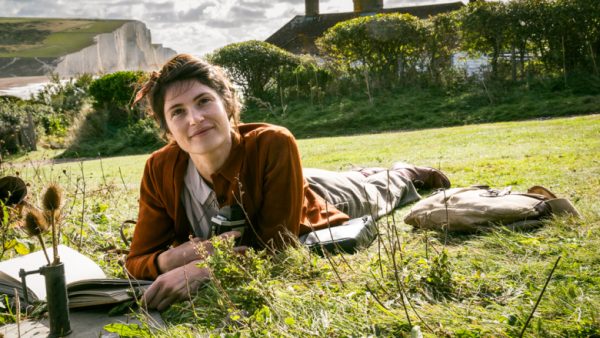Film Review: “Summerland” — Dreams Delayed
By Peg Aloi
While there’s plenty of wistful romance and character-driven conflict to keep Summerland rolling along, the narrative isn’t exactly plausible.
Summerland, directed by Jessica Swale. (VOD)

Gemma Arterton in scene from Summerland. Photo: Michael Wharley
Playwright Jessica Swale’s writing and directing debut is mostly told in flashback. It begins briefly in 1975: Alice Lamb (Penelope Wilton) is working on her latest book. She seems irritated, distracted, and annoyed when some noisy children run past the windows of her large country house, where she lives alone. The action then moves to the late ’30s in England, where Alice (her younger self played by Tamara Drewe’s Gemma Arterton) lives in a small village not far from the white cliffs of Dover. This landmark appears repeatedly, serving as a motif designating that the location is remote, romantic, and, of course, irrevocably tied to memories of the First and Second World Wars. In Alice’s unnamed small village, she has a reputation for being a hermit. Children call her a “witch” and play pranks. She’s generally unpleasant to people and craves solitude.
Alice is a folklorist working on the latest in a series of books. Her research involves sketching scenes from nature and poring over volumes of mythology and history. The image of the fata morgana, the mirage conjured up by Morgan le Fay to lure sailors to their death, is her current obsession. Much to her chagrin, Alice has been selected by the local school’s headmaster (Tom Courtenay) to host a child displaced by the London bombing. During the war, children were housed in rural areas to keep them safe from violence and mayhem in the capital city. Young Frank (Lucas Bond) is shy at first, but polite and eager to please the disgruntled Alice, who makes no secret of the fact that she doesn’t want the boy in her home. She rudely dismisses his questions and mostly ignores him while she works. When he asks what’s for dinner, she puts a raw egg, a chunk of bacon, and a raw potato on a plate and tells him he has to cook his own food. She has agreed to host Frank for one week until another family can be found.
Frank befriends another loner at school, the tomboyish and precocious Edie (Dixie Egerickx), who believes her mother doesn’t want her because she doesn’t fulfill her expectation of what a girl ought to be. A parallel is drawn between Edie and Alice: we learn in flashbacks that Alice had a brief love affair with a young woman in the ’20s, which ended because Vera, her paramour (Motherless Brooklyn’s Gugu Mbatha-Raw), didn’t see how their relationship could escape scandal. Also, we later learn that her lover wants to have a child. The expectations for women in those days were confining and limited. Alice is haunted by memories of Vera. Her lonely existence is eased somewhat with the arrival of Frank; his curiosity and zest for life make him a natural companion for Alice’s inventive research on the myths and legends of the British Isles. Together they explore the hillside near the shore and glimpse the castle in the clouds that Alice names “Summerland.” She explains that it is a sort of “pagan heaven” that exists alongside the one we inhabit, a place where the dead are never very far away. The attractions of this fey landscape, and the illusory fata morgana, nurture a companionship between these two misplaced souls.
Alice and Frank’s first week passes quickly. She lets him go, thinking he’ll still be living in the village. They’re both horrified to learn that Frank will have to go live up north and won’t be able to stay in the school where he’s made friends. Alice knows that the right thing to do would be to keep Frank with her. But their brief reunion is marred by the inevitable losses that come in wartime.
While there’s plenty of wistful romance and character-driven conflict to keep Summerland rolling along, I didn’t find the narrative terribly plausible. Some of the plot points come off as rather contrived and unlikely. What I did enjoy were the actors’ honest portraits of misfit characters who are doing their best to find peace in difficult times. Arterton is convincing as a woman who immerses herself in work in order to avoid confronting her emotions. But some details about her life didn’t make sense. How does the single Alice, who makes a living writing books about folklore, afford an enormous and well-appointed cottage by the seaside? How does she survive during the war when so many people are strapped? We are given glimpses of hardship (ration books), but wartime difficulties don’t come off as hindrances so much as excuses for set pieces and scenic backdrops. Also, the scandalous nature of Alice and her lover’s lesbian affair was only part of what would have raised eyebrows in those days: they were an interracial couple. But that challenge is not even mentioned.
Swale’s directorial debut is not wholly without merit: the actors’ performances are solid and the period details are seamless. But the emphasis on supplying feel-good outcomes for challenging problems weakens what might have been a powerful exploration of the obstacles that women faced surviving in a Britain that had sent the majority of its young men off to war.
Peg Aloi is a former film critic for the Boston Phoenix and member of the Boston Society of Film Critics. She taught film studies in Boston for over a decade. She writes on film, TV, and culture for web publications like Vice, Polygon, Bustle, Mic, Orlando Weekly, Crooked Marquee, and Bloody Disgusting. Her blog “The Witching Hour” can be found at themediawitch.com.

